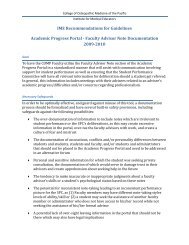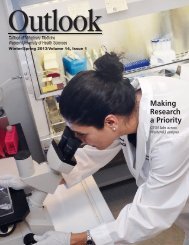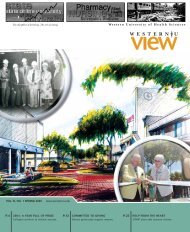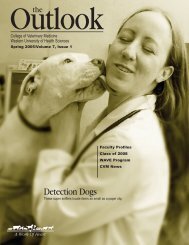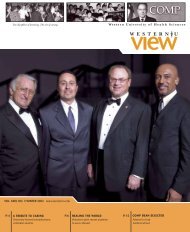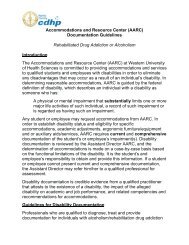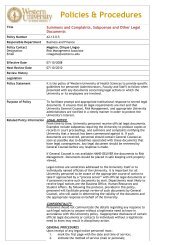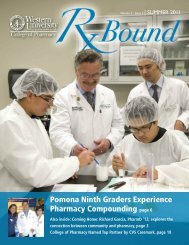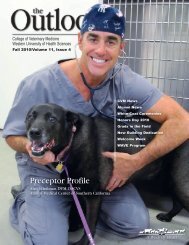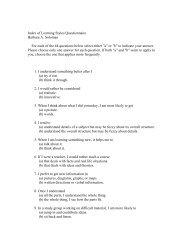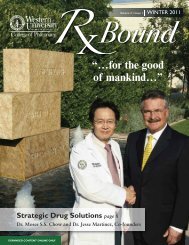Transparency, Apology, & Disclosure of Medical Errors - Western ...
Transparency, Apology, & Disclosure of Medical Errors - Western ...
Transparency, Apology, & Disclosure of Medical Errors - Western ...
- No tags were found...
Create successful ePaper yourself
Turn your PDF publications into a flip-book with our unique Google optimized e-Paper software.
<strong>Transparency</strong>, <strong>Apology</strong>, and<strong>Disclosure</strong> <strong>of</strong> <strong>Medical</strong> <strong>Errors</strong>College <strong>of</strong> Osteopathic Medicine <strong>of</strong> the Pacific<strong>Western</strong> University <strong>of</strong> Health SciencesMark Quirk, Ed.D.Pr<strong>of</strong>essor, Assistant Deanand Director
Objectives1. Describe the characteristics and benefits <strong>of</strong>disclosure and a good apology2. Use apology effectively with patients andfamily members, staff, colleagues, andfriends3. Guide others (colleagues or „disclosureteam‟) in the use <strong>of</strong> disclosure and apology
<strong>Medical</strong> <strong>Errors</strong> are PervasiveGeneral Public• 30-45% report error affecting self or familymember 21% report error resulting in personalharmPhysicians• ?Schwappach 2004, Mazor 2004, 2006, Kaiser Poll, Blendon 2002
Most errors are made by goodbut fallible people working indysfunctional systems
Patients want to be told!• 87% think physicians should be required to tell patientsabout errors(Kaiser/AHRQ poll, 2006)• 91% say patients should always be told, even if no harm.(Mazor et al, 2004)• 92% want to know about complications(Hingorani et al 1999)• 98% want even minor errors acknowledged(Witman et al 1996)
Physicians <strong>of</strong>ten DON’T disclose…physicians who discussed error with patient/family4% (Residents; Engel et al 2006)6% (Residents; Mizrahi 1984)9% (Physicians; Lander 2006)21% (Physicians; Allman 1998)24% (Residents; Wu et al 1991)28% (Residents; Hobgood 2005)
When asked directly physicianssaid they would . . .<strong>Errors</strong> that Result in -- Minor Harm Major HarmHypothetically ReportHave Actually Reported73% 92%18% 4%
<strong>Apology</strong>1. Communicate remorse2. Disclose• Take responsibility• Offer an explanation3. Listen to the patient’s perspective(facilitate expressions <strong>of</strong> emotion)4. Empathize5. Offer reparation
Rationale for<strong>Apology</strong> (and<strong>Disclosure</strong>)It is the human thing to do
California <strong>Apology</strong> LawEvidence Code 1160The portion <strong>of</strong> statements, writings, or benevolentgestures expressing sympathy or a generalsense <strong>of</strong> benevolence relating to the pain,suffering, or death <strong>of</strong> a person involved in anaccident and made to that person or to the family<strong>of</strong> that person shall be inadmissible as evidence<strong>of</strong> an admission <strong>of</strong> liability in a civil action.A statement <strong>of</strong> fault, however, which is part <strong>of</strong>,or in addition to, any <strong>of</strong> the above shall not beinadmissible pursuant to this section.
Likely to Reduce the Cost <strong>of</strong>Malpractice Litigation• Patients who believe they are receivingincomplete information about an error<strong>of</strong>ten litigate to learn more• Apologies may help deter legal actionand promote more effective settlements• Damage awards are <strong>of</strong>ten higher iferrors were not disclosed
The Trial Lawyer Perspective“I would never introduce a doctor’s apology incourt. It is my job to make a doctor look badin front <strong>of</strong> a jury, and telling the jury the doctorapologized and tried to do the right thing killsmy case.”- President, South Carolina TrialLawyers Assoc.
Summary<strong>Apology</strong> anddisclosure . . .• Should occur more <strong>of</strong>ten• Is important and justifiable• Can be (dramatically) improved
Adverse Events/NeverEvents/Sentinel Events/Misadventures/Unintended Error orUnanticipated Outcomes• System (Lost Lab Result)• Medicine (Wrong Diagnosis orWrong Prescription)• Communication (Poorly DeliveredEmpathy or „Bad News‟)
System EventsThe Lost Test Result 1
What NOT To Say?
System EventsThe Lost Test Result 2
What DO You Say?• Use genuine compassion to communicateremorse• Take responsibility• Listen to and respect patient‟s perspective• Provide a good explanation using simpleterms• Empathize• State what you can or will do• Follow-up
What DO You Say?• Use genuine compassion to communicateremorse
CommunicateRemorseI’m I’m truly I’m very sorrysorry
What DO You Say?• Use genuine compassion to communicateremorse• Take responsibility
Take responsibility“That I did not effectively“That the communicationcommunicate that to you”wasn‟t better”“That “That I didn‟t you didn‟t get that receive test result the test toyou quicker” result quicker”
Ways <strong>of</strong> Failing to Take Responsibilityfor the OffenseOffering a vague and incomplete <strong>of</strong>fense“I apologize for whatever I did”Using the passive voice“Mistakes were made”Making the <strong>of</strong>fense conditional“If I did anything wrong”Questioning whether the victim was damaged“To the degree that you were hurt”
What DO You Say?• Use genuine compassion to communicateremorse• Take responsibility• Listen to and respect patient‟s perspective• Provide a good explanation using simpleterms
Elicit Perspective and Add A GoodSimple Explanation• Ask what they know• Tell them what they need to know— Meet patient „where they‟re at‟• Avoid jargon• Small doses <strong>of</strong> information• Ask for understanding
Demonstrate Listening
Let the Patient TalkDoctors interrupt patients: mean ________ seconds• Only 23% <strong>of</strong> patients completed opening statement• If uninterrupted, patient took mean <strong>of</strong> 60 seconds and not> 2 1/2 minutes.• Longer the time before interruption --> more complaintselicited• Order in which complaints were given did not correlatewith clinical importance.Beckman and Frankel; Ann <strong>of</strong> Int Med Nov 1984
What DO You Say?• Use genuine compassion to communicateremorse• Take responsibility• Listen to and respect patient‟s perspective• Provide a good explanation using simpleterms• Empathize
Adverse Events/NeverEvents/Sentinel Events/Misadventures/Unintended orUnanticipated Outcomes• System (Lost Lab Result)• Medicine (Wrong Diagnosis or WrongPrescription)• Communication (Poorly Delivered Empathyor „Bad News‟)
CommunicationEventThe Angry FamilyMember
Missed Clues(Empathic Opportunities)• Thoracic surgeons or oncologists respondedto 39/384 empathic opportunities (10%)• 5 0 % o f t he s e statements occurred in thelast one-third <strong>of</strong> the encounter, whereaspatients concerns were evenly raisedthroughout the encounter.• Conclusion: Too little too lateMorse, et al 2008
Recognize Clues (Surgery & Primary Care)**• Clues per visit• Emotional in nature• Responded positively topatient emotionsSPC1.9 2.660 % 70%38% 21%Levinson, et al 2000 JAMA
What DO You Say?• Use genuine compassion to communicate remorse• Take responsibility• Listen to and respect patient‟s perspective• Provide a good explanation using simple terms• Empathize• State what you can or will do• Follow-up
Adverse Events/NeverEvents/Sentinel Events/Misadventures/Unintended orUnanticipated Outcomes• System (Lost Lab Result)• Medicine (Wrong Diagnosis or WrongPrescription)• Communication (Poorly DeliveredEmpathy or „Bad News‟)
Medicine Event:WrongPrescription
Make reparations
How Apologies Heal: The Casefor Changing the Dialogue• Restoration <strong>of</strong> self-respect and dignity• Both parties have shared values• Offended party will be safe in future encounters: apromise for the future• Expressing the impact <strong>of</strong> the <strong>of</strong>fense and knowing ithas been heard• Empowerment <strong>of</strong> the <strong>of</strong>fended party
<strong>Disclosure</strong> and apology can be handled by anindividual provider or a team<strong>Disclosure</strong>/<strong>Apology</strong> Team(Key Functions & Roles)• Provider and/or Representative(Remorse; Explanation in lay terms)• Clinical expert (<strong>Medical</strong> aspects <strong>of</strong> thecase including recovery)• Reparation expert (Compensation &follow-up)



